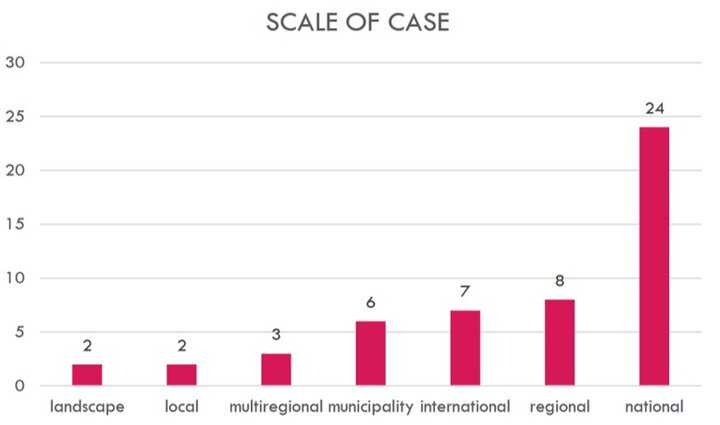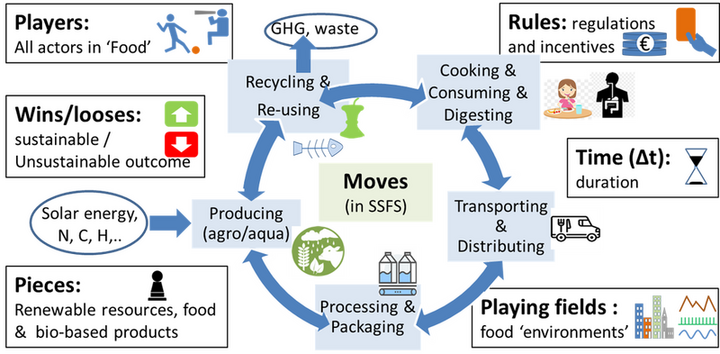Sustainability
Transforming food systems through inclusive partnerships: insights from FOODPathS
Balance Phala2, Maurine Mames3, Camila Massri1, Matteo Sabini1*,
Anna Bruen2, Hugo De-Vries3
*Corresponding author
1. EUFIC, Brussels, Belgium
2. ICLEI World Secretariat, Bonn, Germany
3. INRAE, Montpellier, France


KEYWORDS
Food systems sustainability
Partnerships
Inclusivity
Stakeholder engagement
Abstract
The food sector faces interconnected crises, including climate change, resource scarcity, and social inequality, that necessitate an urgent shift to sustainable systems. The European Commission’s "Partnership on Sustainable Food Systems (FutureFoodS)" aims to address these challenges, supported by the Horizon Europe-funded project FOODPathS. FOODPathS is developing a Prototype for an ideal Sustainable Food Systems (SFS) Partnership through stakeholder engagement, aiming to foster inclusivity and balance trade-offs. This article explores key elements of an inclusive partnership, the role of Mirror Groups, and lessons learned from existing collaborations in the food sector.
The food sector is increasingly affected by climate change, land degradation, biodiversity loss, hunger, malnutrition, diet-related diseases, food and packaging waste and safety, scarcity of fresh water and (renewable) resources, ecosystem services, social and economic inequalities, political tensions, and safeguarding food cultural heritage. These overlapping crises demand urgent need for an accelerated transition to sustainable food systems across Europe, and globally. To address these challenges, a systemic and collaborative approach among different actors is essential.
In response, the European Commission and its Member States, have joined forces to establish the ‘Partnership on Sustainable Food Systems (SFS) for people, planet and climate’(FutureFoodS) to support this transition through actions like open calls for Research & Innovation projects.
Ahead of this, the Horizon Europe-funded project FOODPathS is co-creating a “Prototype” to define what an ideal SFS Partnership should include. By engaging stakeholders at local, national and European levels through workshops, surveys and other forms of consultations and research, FOODPathS provides recommendations to FutureFoodS’ such that activities and priorities align with stakeholder needs and expectations. This Prototype has also the potential to provide valuable insights for for all the other European Partnerships working in the Food Systems area, such as the Circular Bio-based Europe Joint Undertaking (CBE JU), the Partnership for Research and Innovation in Mediterranean Area (PRIMA initiative), and the European Partnership for a climate neutral, sustainable and productive Blue Economy (SBEP).

Partnerships in Food Systems: Current Practices
The term Partnership is not new. Many forms of partnerships are found in literature, appearing in various forms such as living labs, clusters and technological platforms. Defined as “an arrangement in which several people or organizations work together to arrange something” (1), partnerships are essential mechanism for coordinated efforts.
With the aim of exploring how the various forms of partnerships look like, FOODPathS explored 52 examples of multi-stakeholder collaborations across Europe -at various scales (see Figure 1), preferentially including private sectors. The case studies collected among partners were analysed using the game framework designed by de Vries et al. (2) to describe all cases consistently using the following criteria: time, playing field, players, pieces, moves, rules and outcomes.
The analysis revealed that nearly half of the cases (47%) involve predominantly private-public actors focused on ‘innovation’ (3). The rest of the cases was quite heterogeneous. However, inclusivity remains underrepresented in European multi-stakeholder collaborations. Most partnerships emphasize economic outcomes, reflected in the frequent references to “innovation” and “competitiveness”. Only a small number of cases prioritised environmental and social dimensions of sustainability.
The diversity of visions illustrated in these cases shows that there are many ways of achieving the same goal. Partnerships with a well-balanced diversity of actors from different sectors and scales can inspire others to adopt similar approaches, fostering broader systemic change.

Figure 1. Scale of partnerships studied (source: the authors).
FOODPathS will further explore (a) food system (FS) concepts (see Figure 2) to understand relationships between food actors (‘players’), their food handling activities (moves), used products (‘pieces’), geographic-socio-cultural contexts (‘playing fields’), duration of actions (‘time’), (un-) sustainable outcomes (‘win/loose’), regulations, ambitions, and R&I co-funding options (‘rules’), (b) a Hub of FS(Living) Labs that highlights multi-actor co-creation best practices, (c) an FS Observatory for monitoring sustainability performance of EU FS, and (d) RIPE agendas to align research and innovation, policy and education priorities.

Figure 2. Food Systems Concepts. Modified from: de Vries, Donner, Axelos 2022 in TIFS (4).
Building blocks of an ideal Food Systems Partnership
According to FOODPathS, key elements of a successful partnership include: governance model; funding mechanism and strategy; a Strategic Research and Innovation Agenda (SRIA); a Modus Operandi, a series of rules and procedures to ensure the management and development of the partnership; an observatory to measure the impact of the actions implemented and a virtual Hub of FS labs that serves as a vitrine of successful case studies; and an educational framework to ensure that skills and knowledge needed for the food systems transformation can be provided by the educational entities.
Decisions made within a partnership often involve trade-offs, letting benefiting some actors while posing challenges for others, which can create tensions among stakeholders. For instance, a long-term objective stated in the SRIA (e.g., shift towards more sustainable packaging) could result in opportunities for some stakeholders (boost innovation for tech companies developing new packaging methods) but increase costs or negative effects for others (the food processing companies, that will face higher costs, and the consumers, that may pay for such a change with an increase in the final price).
To reveal these ‘trade-offs and co-benefits’, FOODPathS has been focusing on working with a food systems approach and understanding how partnerships can be effectively inclusive. Creating an inclusive and effective food systems partnership requires more than just gathering stakeholders. It involves building an inclusive and dynamic environment where diverse voices contribute meaningfully to the transformation process. A food systems approach is instrumental, as it enables stakeholders to better understand the complex interactions, trade-offs, and strategic leverage points necessary to foster innovation at both policy and practice levels.
Workshop discussions during the FOODPathS annual meetings in Rome, Italy and Seinäjoki, Finland, revealed the need for strategies that balance competing priorities, such as reducing greenhouse gas emissions while keeping food prices affordable. This is where the concept of inclusive partnerships becomes vital, to ensure that all relevant voices from policymakers and industry leaders to small-scale producers and marginalized communities are not only heard but actively contribute to shaping the direction of the transformation. The food systems approach emphasizes understanding the interactions between these priorities, enabling more effective policy and innovation actions.

Inclusive Food Systems Partnerships: how mirror groups and stakeholder engagement drive change
FOODPathS has placed inclusivity at the center of its strategy, using tools such as Mirror Groups to engage stakeholders. These groups bring together organizations and initiatives that may not be directly involved in the partnership but are impacted by its outcomes or have valuable expertise to offer.
Mirror Groups allow stakeholders from diverse regions, continents and sectors, often underrepresented, to provide input and recommendations into the decision-making process of the project or partnership. Mirror Groups help overcome the limitations faced by traditional projects’ consortia and partnerships, such as time and funding constraints, which often limit the number of organizations involved in these initiatives. By bringing in additional voices especially from underrepresented communities and smaller organizations, Mirror Groups ensure that decisions reflect society’s broader interests. Stakeholders such as small-scale producers, civil society organizations, and industry representatives contribute meaningfully to shaping the partnership’s direction, ensuring that decisions are aligned with a wide range of societal needs.
A recent Mirror Group workshop, involving representatives from diverse European organizations, shed light on the importance of inclusivity in food systems partnerships and identified key features that it should include. First, its governance should be transparent, collaborative, and responsive to the needs of all stakeholders. This includes facilitating knowledge sharing, creating a participatory infrastructure, and ensuring a clear regulatory and governance framework that supports inclusive decision-making processes. Secondly, the decision-making process should be based on the principles of co-creation, employing a bottom-up approach that considers the input of all stakeholders. Finally, as a crucial element of any partnership, funding should be structured in a way that minimizes administrative burden, provides adequate support to applicants and addresses different target groups with tailored funding opportunities and incentives. The use of tools such as consultations, surveys, and regular reviews are essential to monitor progress, identify barriers, and make necessary adjustments to the partnership’s direction. Detailed discussion points from the mirror group can be found in a dedicated page on the project website (4).
Mirror Groups are part of a broader strategy that includes interviews, workshops, and network-building to foster inclusive decision-making. These methods work together to build trust and collaboration, essential for long-term success.
Interviews and workshops enhance Mirror Groups by creating relationships that support meaningful engagement. This comprehensive approach ensures that even smaller organizations can participate effectively while promoting transparent governance and equitable decision-making.
More detailed recommendations on building inclusive partnerships have been included in the FOODPathS leaflet (5).
What’s next
FOODPathS remains committed to finalising the Prototype for the Partnership on Sustainable Food Systems (SFS). The Prototype is expected to be launched and presented in May 2025, during the “FOODPathS Festival” in Brussels. This event will serve as a forum where different stakeholders can interact, provide feedback, and explore how they can contribute and benefit from the implementation of the proposed Prototype.
Leading up to the festival, further stakeholder engagement will help refine the Prototype through a workshop (organized alongside an event of the BIOEAST Initiative and the Hungarian Presidency of the European Union), a final Mirror Group meeting, and surveys.
The final Prototype and knowledge gained throughout FOODPathS will be transferred to FutureFoodS, other Partnerships and the European Commission for further development and implementation.
References and notes
- Cambridge Dictionary. Partnership definition 2024. PARTNERSHIP | traduire en français - Cambridge Dictionary (accessed July 12, 2024).
- de Vries H, Donner M, Axelos M. Sustainable food systems science based on physics’ principles. Trends in Food Science & Technology 2022;123. Sustainable food systems science based on physics’ principles - ScienceDirect.
- de Vries H, Donner M, Fabiano F, Mamès M, Lazaro-Mojica J, Cotillas E, et al. Co-creation in partnerships contributing to the sustainability of food systems: insights from 52 case studies in Europe. Front Sustain Food Syst 2024;8. Frontiers | Co-creation in partnerships contributing to the sustainability of food systems: insights from 52 case studies in Europe.
- FOODPathS project website [Internet]. Brussels (BE): FOODPathS project; 2023. Insights from the first FOODPathS Mirror Group meeting; 2024 July 26 [cited 2024 October 3]. Available from: Insights from the first FOODPathS Mirror Group meeting - FOODPathShttps://www.foodpaths.eu/news-item/insights-from-the-first-foodpaths-mirror-group-meeting/
- FOODPathS project website [Internet]. Brussels (BE): FOODPathS project; 2023. Leaflet – Recommendations for an inclusive partnership; 2024 [cited 2024 October 3]. Available from: Leaflet - Recommendations for an inclusive partnership - FOODPathS

